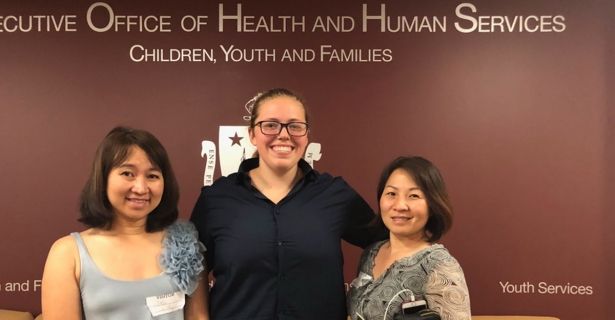Last week, at the Massachusetts Office for Refugees and Immigrants, I was honored to interview two women who fled Vietnam as refugees over thirty years ago. Thuy Leung and her sister spoke with me about their journey from Vietnam to America. It was a difficult discussion and a heartbreaking story, and unfortunately stories like these are more common than I realized.
When Thuy Leung was eight years old, she and three of her eight siblings fled Vietnam in an overcrowded fishing boat. In order to escape government scrutiny, Thuy’s mother made the heartbreaking decision to stay behind and help her other siblings flee separately. Her sixteen year old brother physically tossed them aboard, and after ten days on the water, they arrived as refugees in San Francisco.
“We were lucky because we were together,” Thuy’s sister explained, “the trauma of traveling over here is, of course, difficult, but the separation from your parents is also very hard.” Drawing on her own experience as a refugee, Thuy spoke sadly about children crossing the Mexican-American border who were forcibly separated from their families. “For a kid to process all that is not easy, but without their parents? Even more traumatic.”
After being adopted by a family in Virginia, Thuy and her siblings slowly got accustomed to American culture. She explained how little cultural differences made her and her siblings feel isolated, even something as small as not sharing food at the dinner table. Eating was a very communal experience back home, but in Virginia, meal times weren’t conducted the same way. It took many years to get used to the changes, but being young made adapting much easier.
When Thuy grew up she decided to move to Boston. Without a sense of direction, she sifted through several jobs, including being a paralegal, a community organizer, a pharmaceutical sales rep and an oncology nurse. After getting married and starting a family, Thuy decided on nursing school, but she didn’t fall in love with her work. It was only when a friend convinced Thuy to visit the salon she owned that she discovered her passion. During her time in the salon, Thuy was fascinated by lash extensions. She loved the process of transforming a client’s face with a simple lash and found it to be rewarding. Clients left the salon feeling like completely new individuals, and Thuy wanted to give people that experience.
Like a true, 21st century American, Thuy Leung turned to YouTube for tutorials on lash extensions. She watched videos for hours before bed and then daydreamed about lashes at nursing school. After realizing that balancing nursing and her growing family was not sustainable, she quit to focus on raising three children and pursuing her love for lashes. a referral-only business in her attic. Slowly, it grew into a successful company. With more clients came the need for more space, so Thuy opened EYE LUSH in Quincy, a quick walk away from her house to be able to stay close to her family. It has flourished, despite many roadblocks along the way. From a crooked contractor to a lack of access to knowledge for aspiring beauticians, Thuy overcame the odds and developed a thriving business that is still on the rise.
The Leung Family’s story is just one example of the many refugees who arrive with nothing and work hard to achieve everything.
We discussed current day politics as well as her story as a refugee, especially the fear surrounding immigration in America. “Many people are operating on fear, rather than imagining the possibilities that come with a nation of immigrants… We are a country that takes care of each other,” Thuy spoke emphatically.
When discussing President Trump, the conversation turned towards a lack of empathy. Many people are quick to make assumptions, but rarely do they imagine themselves in a life or death situation where fleeing the country is your only option.
World Refugee Day was June 20th, so talk to your neighbors and coworkers about their journeys. Compassionate interaction leads to understanding, and Thuy hopes that sharing her story will inspire others to do the same.

